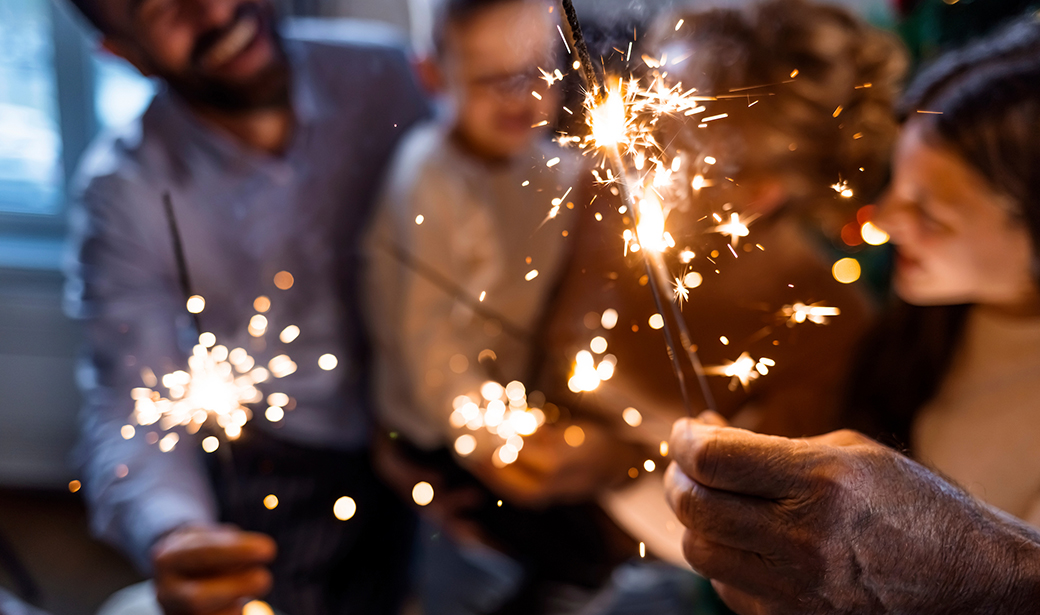Celebrating the Fourth of July can be a blast — as long as fireworks go where they’re supposed to.
All fireworks come with injury risks, including sparklers, because they give off heat. For trauma surgeon Jeffrey Coughenour, MD, and orthopaedic hand surgeon Daniel London, MD, July Fourth often means treating preventable injuries caused by fireworks.
“The hands are more often talked about, but we’ve seen injuries from head to toe,” Coughenour said. “We’ve treated burns to the face, eye injuries and devastating injuries to the face and skull from mortar shells. Areas of the body not protected by clothing are potentially more at risk.”
As the region’s only Level 1 Trauma Center, MU Health Care has full emergency services available around the clock to treat the most severe injuries. Orthopaedic surgeons like London are ready to step in if the worst does happen.
“Most firework injuries are burns, which can be treated by our awesome emergency teams when not too severe,” London said. “But the more severe injuries, when a firework explodes in someone’s hand, those involve multiple bones, tendons, ligaments, nerves and arteries as well as the skin. Those can be very challenging.”
1. Leave it to the Professionals
Avoiding burns or explosive injuries starts with common sense. For some people, that means enjoying professional firework displays in their comm
unity.
“We don't see firework injuries from those events,” London said. “We see injuries from people shooting off fireworks at their own at home. So, the best way to not have injuries is to just simply leave it to the professionals.”
While not recommended, if you decide to set off your own display, buy fireworks from reputable manufacturers, read the instructions before lighting the fuse and set them off outdoors away from people, buildings and trees. A physical barrier and distance, particularly for kids, is important.
Keep a water source nearby to put out any fires, and make sure the person in charge of setting off the fireworks is sober.
“There's no question the risk of injury goes up with alcohol or any other sort of illicit drug use,” Coughenour said. “That's a common factor in the more severe injuries that we see. Any activity that requires responsibility and supervision should always be done by somebody that's sober.”
2. Know How to Treat Firework Burns
Accidents happen, and while some burns can be treated at home, more serious wounds need expert care. If the symptoms of your burn are redness, pain, minor blistering or that it is warm to the touch, care for it at home. Remove any heat sources and apply cool water to the area.
Clean the area at least once a day with gentle soap and water. Aloe or non-scented moisturizers can help your skin recover.
Some minor burns can progress over 24-48 hours after the initial injury. If you think the burn area has worsened, is infected, or is very painful and deeper than the outer layer of your skin, seek medical attention. An Urgent Care visit is a good place to start.
“Any time a burn is causing a significant amount of pain, or the skin appears to have changed since the initial injury, there can be concern for infection or progression of the burn,” Coughenour said. “I would advise you get evaluated by one of our doctors so we can assess the need for specialized dressings, or in some cases, surgery.”
3. Protect Your Hands (They’re Delicate)
The hands are the No. 1 area of the body injured by fireworks in kids and second-most injured for adults. And if you’ve ever worn a hand or arm cast, you know how important hands and fingers are to independence and everyday tasks.
Most fireworks create force, and that means more disruptive injuries. London suggests not holding fireworks longer than necessary, and never around a flame or heat source. Gloves and fuse extenders are both easy to find.
“As a Level I Trauma Center, we offer incredibly high-quality care for trauma injuries, but that means when we get called in on the Fourth of July for a fireworks injury, it’s usually pretty bad,” London said. “We want people to be celebrating with family and friends rather than sitting in the hospital.”
4. Have Fun and Be Smart
The Fourth of July is a foundational holiday in the United States and celebrating it is an important part of many Americans’ lives. An emergency room trip is a great way to ruin a good time.
Designate someone responsible, and not intoxicated, to set off any fireworks you have. And have a plan before you touch lighter to fuse.
“It's a fantastic holiday to celebrate our country,” Coughenour said. “Please use common sense and be mindful of everybody around you. Have a plan for safety to keep the risk of unintentional injury as low as possible.”





